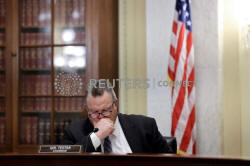U.S. senators push for infrastructure plan that avoids tax hikes
 Send a link to a friend
Send a link to a friend
 [June 10, 2021] By
David Morgan and Susan Cornwell [June 10, 2021] By
David Morgan and Susan Cornwell
WASHINGTON (Reuters) -A bipartisan group of
10 senators is trying to craft a plan to revitalize U.S. roads and
bridges without tax hikes, lawmakers said on Wednesday, though some of
President Joe Biden's fellow Democrats fretted that such an approach on
infrastructure legislation would fail.
Revamping America's infrastructure is a high priority for Biden, but his
sweeping $1.7 trillion proposal has run into trouble in a Congress that
his party only narrowly controls, making Republican support pivotal.
Republican Senator Mitt Romney told reporters that members of the group
have reached "tentative conclusions" on their plan but did not provide
details. The proposal is expected to total nearly $900 billion.
"We're not raising taxes," Romney told reporters. "We're going to be
talking to other members to see if we can get enough support for this to
have the necessary votes to be successful."

A Democratic member of the group, Senator Jon Tester, said he would be
willing to look at funding an infrastructure plan without raising taxes
though he was not committed to that approach.
"I would consider it, sure," Tester said. "I think there's plenty of
pots of money out there - hopefully they're not all smoke and mirrors."
The bipartisan group also includes Republicans Rob Portman, Bill
Cassidy, Susan Collins and Lisa Murkowski, and Democrats Kyrsten Sinema,
Joe Manchin, Mark Warner and Jeanne Shaheen.
Some liberal Democrats have become frustrated https://www.reuters.com/world/us/liberal-democrats-restless-over-bidens-infrastructure-talks-with-republicans-2021-06-04
by the long-running talks, and have worried that this will lead to a
smaller deal that does not include party priorities, including funding
for schools and home healthcare.
'STAND-FOR-NOTHING MINIMALIST'
Senate Banking Committee Chairman Sherrod Brown sounded pessimistic
about the chances for bipartisan success, saying an infrastructure plan
without tax hikes on corporations and the wealthy to help pay for it
would have little credence with his fellow Democrats.
"There aren't 10 Republicans who are even willing to talk to us about
compromise," Brown said. "And if they get exactly 10 Republicans, you'd
probably lose some Democrats if it's too squish, middle-of-the-road,
stand-for-nothing minimalist."
Cassidy, who spoke to Biden about infrastructure by phone on Tuesday,
predicted that any plan containing tax hikes would not receive enough
Republican support to pass the Senate.
[to top of second column] |

U.S. Senator Jon Tester (D-MT) chairs a Veterans Affairs Committee
hearing on Capitol Hill in Washington, U.S. June 9, 2021.
REUTERS/Jonathan Ernst

The Senate is divided 50-50, with Democrats in control because Vice President
Kamala Harris can cast a tie-breaking vote. Sixty votes are needed in the
100-seat chamber to advance most legislation.
Biden has proposed raising taxes on U.S. corporations to help fund a sweeping
package that would address physical infrastructure projects, as well as climate
change and social programs. Republicans have shown no appetite for tax
increases, having strongly backed a 2017 tax cut law signed by former President
Donald Trump.
Portman said the group is looking at funding mechanisms for their proposal that
could face Democratic resistance, including unspecified user fees and tapping
into funds for COVID-19 pandemic-related unemployment payments to individuals
that some states have returned to the U.S. Treasury.
"I think the White House is interested in talking with us about appropriate ways
to look at some COVID funding that's being sent back," said Portman, adding that
lawmakers have also considered an infrastructure bank to fund projects.
Biden broke off talks on Tuesday with Senator Shelley Moore Capito, who had
headed a six-member Republican team, including party leaders and top members of
relevant Senate committees.
Capito had offered Biden $330 billion in new infrastructure spending, far short
of what he has sought.

Cassidy said the bipartisan nature of his group could make a difference.
"That softens the White House line, potentially," Cassidy told an online forum.
"It may allow Republicans to be a little bit more giving."
Separately, a bipartisan group of 58 House lawmakers led by Representatives Josh
Gottheimer and Brian Fitzpatrick known as the Problem Solvers Caucus released a
$1.2 trillion infrastructure framework. The caucus has been working with the
bipartisan group of senators, a source familiar with the negotiations said. The
proposal does not include details on how it will be paid for.
(Reporting by David Morgan and Susan Cornwell; additional reporting by Makini
Brice; Editing by Scott Malone, Will Dunham and Andrea Ricci)
[© 2021 Thomson Reuters. All rights
reserved.] Copyright 2021 Reuters. All rights reserved. This material may not be published,
broadcast, rewritten or redistributed.
Thompson Reuters is solely responsible for this content. |